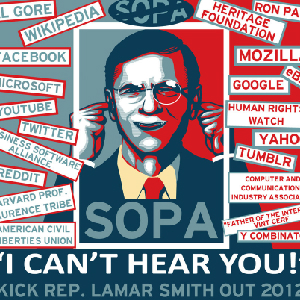From Personal Liberty Digest:

The Web World Fights Back Against Federal Internet Control
January 18, 2012 by Sam Rolley

DEVIANTART.COM/CHADROCCO
An anti-election poster of Representative Lamar Smith rendered by Deviant Art member ChadRocco.
Does the Federal government need to have a hand in controlling the Internet’s vast wealth of information via the Stop Online Piracy Act and Protect IP Act? Many people in the tech industry think not, and some are using the resources at their disposal to fight back.
The proposed legislation is the product of years of lobbying by music labels and film studios to combat pirated content available through search engines and websites. The industries lobbied Congress and the Senate to introduce SOPA, which in its current form would transfer the responsibility for policing the Internet from law enforcement agencies to websites and the Internet providers. The founders of leading search engines and websites such as Google, Facebook, Twitter and Wikipedia are concerned that the bill will have a chilling impact on free speech, innovation and the free-flow of information on the Internet because webmasters would be forced to heavily monitor all content that passes through their pages to avoid liability for copyright infringement.
In an open letter to Congress, the tech innovators argue that SOPA and Protect IP will:
Require web services, like the ones we helped found, to monitor what users link to, or upload. This would have a chilling effect on innovation;Deny website owners the right to due process of law;Give the U.S. Government the power to censor the web using techniques similar to those used by China, Malaysia and Iran; andUndermine security online by changing the basic structure of the Internet.
Though the Administration of Barack Obama has said the President will veto any legislationthat “reduces freedom of expression, increases cybersecurity risk, or undermines the dynamic, innovative global Internet,” Congress has not backed down on SOPA. As lawmakers continue to try to move forward with the Internet regulation legislation, major players in the tech industry are fighting back.
Founder of Wikipedia, an online encyclopedia, Jimmy Wales has called for a “public uprising” against SOPA and Protect IP. His website is joining social news website Reddit — founded by Steve Huffman and Alexis Ohanian — in a 24-hour website shutdown today in protest of the legislation. Search engine Google will also protest the legislation not with a shutdown of its service, but by displaying a message on its homepage for the millions of Americans who use it daily.
“Right now what I’m thinking is that if there is a credible threat that this might happen, this could have a positive impact on the thinking of some legislators,” wrote Wales of the site shutdowns on his blog. “Do not underestimate our power – in my opinion they are terrified of a public uprising about this, and we are uniquely positioned to start that.”
Ohanian — in a recent video blog that can be viewed below — said that government has no business in Internet regulation because lawmakers do not understand the technology, but only understand the money that Hollywood lobbyists are throwing their way to get the laws passed.
Evidence to support Ohanian’s claim that lawmakers have no idea what they are about to do to the Internet may have been best noted in a recent report by a blog called Vice. In a recent post, the blog pointed out that the author of SOPA, Representative Lamar Smith (R-Texas), on his own website actually broke the law he wrote. Smith apparently used the artwork of artist DJ Schulte, which is protected under a Creative Commons license, without any attribution to the artist. If SOPA were in effect, Schulte would likely be able to petition a court to take action against www.texansforlamarsmith.com.
According to Vice, Smith’s website went down for several hours “for maintenance” after the blog posted the article about the lawmaker’s alleged hypocrisy. When it came back up, several images had been changed.

No comments:
Post a Comment